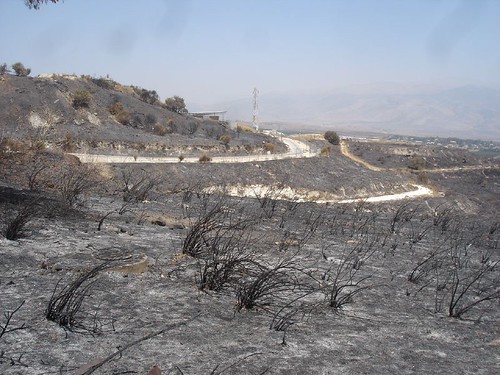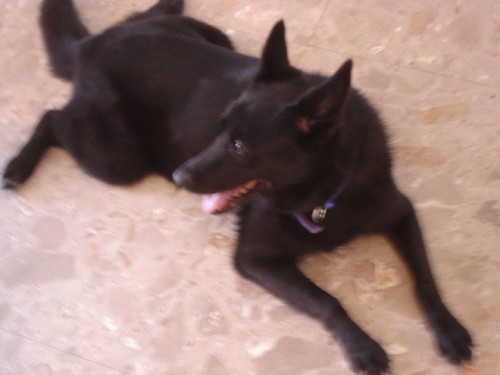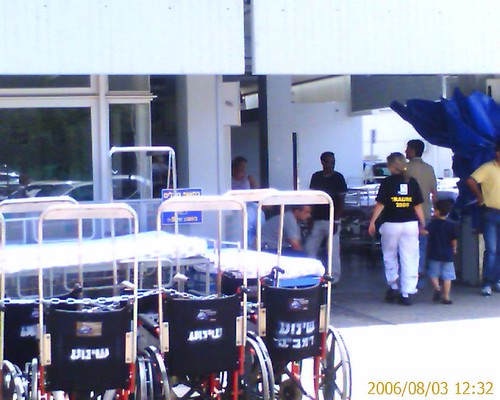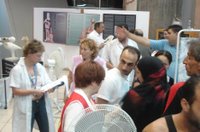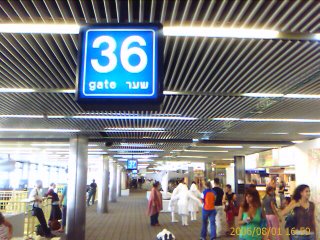
Tuesday 15 August
Irit and I set off for a few days to visit the north of Israel that's closer to the Lebanese border and which suffered the brunt of Hezbollah shelling during the Israel-Hezbollah war of July-August. There's some discussion in Israel whether this was a "war" or a "operation" - I'll call it a war because of the significant consequences and the many lessons to be learned.
We decided to take this trip for several reasons:
We wanted to see with our own eyes the extent of the damage caused by the 4000 rockets fired by Hezbollah against Israel. Irit was convinced from TV reports that the damage was extensive. She imagined that we would find the northern town of Kiryat Shmona bombed out with barely a building untouched. I was sceptical - either way, we wanted to see with our own eyes.
During the war, even though it was no fun in Haifa, we were well aware that it was much worse for the far north of Israel where normal life had been completely paralysed for a whole month. The beautiful Galilee which depends on much of its income from tourism had a very hard time. We wanted to show the northerners we feel for them and we wanted to spend some money there to help, in a modest way, to revive their flagging fortunes
After being cooped up for a month in Haifa waiting for the air raid sirens (with occasional escapes to Tel Aviv) we wanted a bit of a vacation - the north of Israel is beautiful.
Our first stop was Savyonei Yam, a suburb north of Haifa which had suffered several direct hits by Katyusha rockets but we couldn't find any damaged buildings. Next was Nahariya
http://en.wikipedia.org/wiki/Nahariya , the most northerly town on Israel's Mediterranean coast which also suffered many Katyusha hits. Here we saw a few damaged buildings
www.flickr.com/photos/dlisbona/218531655/in/set-72157594242301485/ but life seemed to be returning to normal. Apparently 70% of the population of Nahariya and other northern towns fled to the centre of the country for the duration of the war. I thought we would encounter a lot of traffic of returning residents on the roads but, if anything, there was less than average traffic. From Nahariya we drove to Maalot and from there to Tsfat (Safed) , both of which had suffered many Katyusha rockets but we didn't see any damaged buildings, only patches of forest that had burned as a result of Katyusha fires. We had lunch in the historic resort town of Rosh Pina
http://en.wikipedia.org/wiki/Rosh_Pina - the restaurant was full of soldiers and media folks
http://www.flickr.com/photos/dlisbona/218530357/in/set-72157594212420512/On the way to the northern town of Kiryat Shmona we drive to the holiday village in Kibbutz Gonen, a very pleasant place to stay for a vacation in the Galilee
http://www.flickr.com/photos/dlisbona/218529223/in/set-72157594212420512/ . The north of Israel has many tourist attractions, both historic and scenery and the area is usually full of Israelis with their families during the summer school holidays. There hasn't been a single tourist here for over a month. We come to the reception of the Gonen Holiday Village and find the door locked but Tsubik the manager soon appears. It seems we are the first tourists to visit after the war and we get the royal treatment. Apart from the locals, the only others around are soldiers, conscript and reserve, lots of them, and media people. Later we get to Kiryat Shmona where we see far more damaged buildings
http://www.flickr.com/photos/dlisbona/sets/72157594242301485/ . We see damage in 2 shopping malls and have an excellent coffee and cake in the Alon Cake Shop in the "Heart of the North" mall which also suffered a direct hit. We see lots of people greeting each other. This town of 20,000 souls had been a ghost town for a month. 70% of the population fled to the (safe) centre or south of the country and 30% stuck in out living 24 hours a day in public shelters. Slowly the town is coming to life again. All the cakes in the cake shop were freshly baked this morning.



